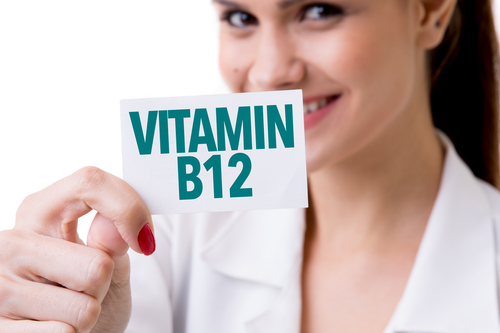*This article was written based on personal experience with B 12 deficiency*
The Importance of Vitamin B12
Vitamin B12, or Cobalamin, dissolves in the body and enters the bloodstream where is it carried around the body. B12 is not produced naturally by the human body but is an essential vitamin for our health. Vitamin B12 is important for the production and health of red blood cells. Red blood cells carry oxygen from the heart to sustain all the muscles and tissues in our body. After they have been depleted of oxygen the red blood cells carry carbon dioxide, a poisonous gas that our bodies need to get rid of, to the lungs where it is exhaled safely out of the body.
Why is Vitamin B12 Deficiency Serious?
Without adequate Vitamin B12, the red blood cell levels drop and anemia results. Anemia is the deficiency of red blood cells. The symptoms of anemia are:
- Weakness, fatigue, lightheadedness
- Mental problems such as memory loss or depression
- Shortness of breath, heart palpitations
- Constipation, diarrhea, gas
- Nerve problems, difficulty walking, muscle weakness or tingling
- Vision loss
- Pale skin
Ultimately if left untreated anemia can result in heart failure. This is extreme and can only happen if all the symptoms are ignored for a considerable period of time. The reason this occurs is because the body needs oxygen to function. As the number of blood cells decreases, the heart has to pump harder and faster to get the remaining red blood cells circulating throughout the body. This puts added strain on the heart and it cannot maintain that ever-increasing burden.
Who is at Risk for Vitamin B12 Deficiency?
In the American and European culture, those must at risk are actually vegans and vegetarians. This is because the primary source of Vitamin B12 is from the consumption of meat and dairy products. Vitamin B12 is actually produced by a bacteria. This bacteria isn’t present in sufficient quantities in humans because of the way we eat and the fact that we cook and clean our food before eating it. Animals don’t have that problem and so people who eat meat, eggs and milk products generally get plenty of B12. It’s rather unpleasant to think about, but it’s the truth.
There are also a number of medical conditions that put people at higher risk for the deficiency:
- People with atrophic gastritis
- Surgery that involved removing part of your stomach or small intestine
- Conditions affecting the small intestine, such as Crohn’s disease, celiac disease, or parasites
- Those who drink high levels of alcohol
- Those who take metformin
All these people are at risk because something is making it harder for B12 to be absorbed into the body. The small intestine is where most of the B12 is absorbed into the body. If there is a problem with the small intestine, even if enough B12 is being consumed, there could still be a deficiency. Same thing with stomach problems, the stomach produces the acid that breaks down what we consume. If the meat is not broken down sufficiently by the acid, the B12 will not be absorbed as it passes through the body. The drug metformin has also been linked to a reduction in B12 absorption.
How to Treat a Vitamin B12 Deficiency?
Fortunately, it is not difficult to treat a deficiency. If it’s simply not eating enough meat or dairy products then increasing the consumption will likely provide sufficient Vitamin B12. If that is not an option, or there are other factors, Vitamin B12 can be injected directly into the bloodstream or can be taken orally through prescribed high dosage or supplement pills based on the individual’s need.
Do you struggle with B 12 deficiency? Tell us how you cope with it.
Video credit: NatureisBeautiful2017 | Youtube


2 thoughts on “B12 Deficiency”